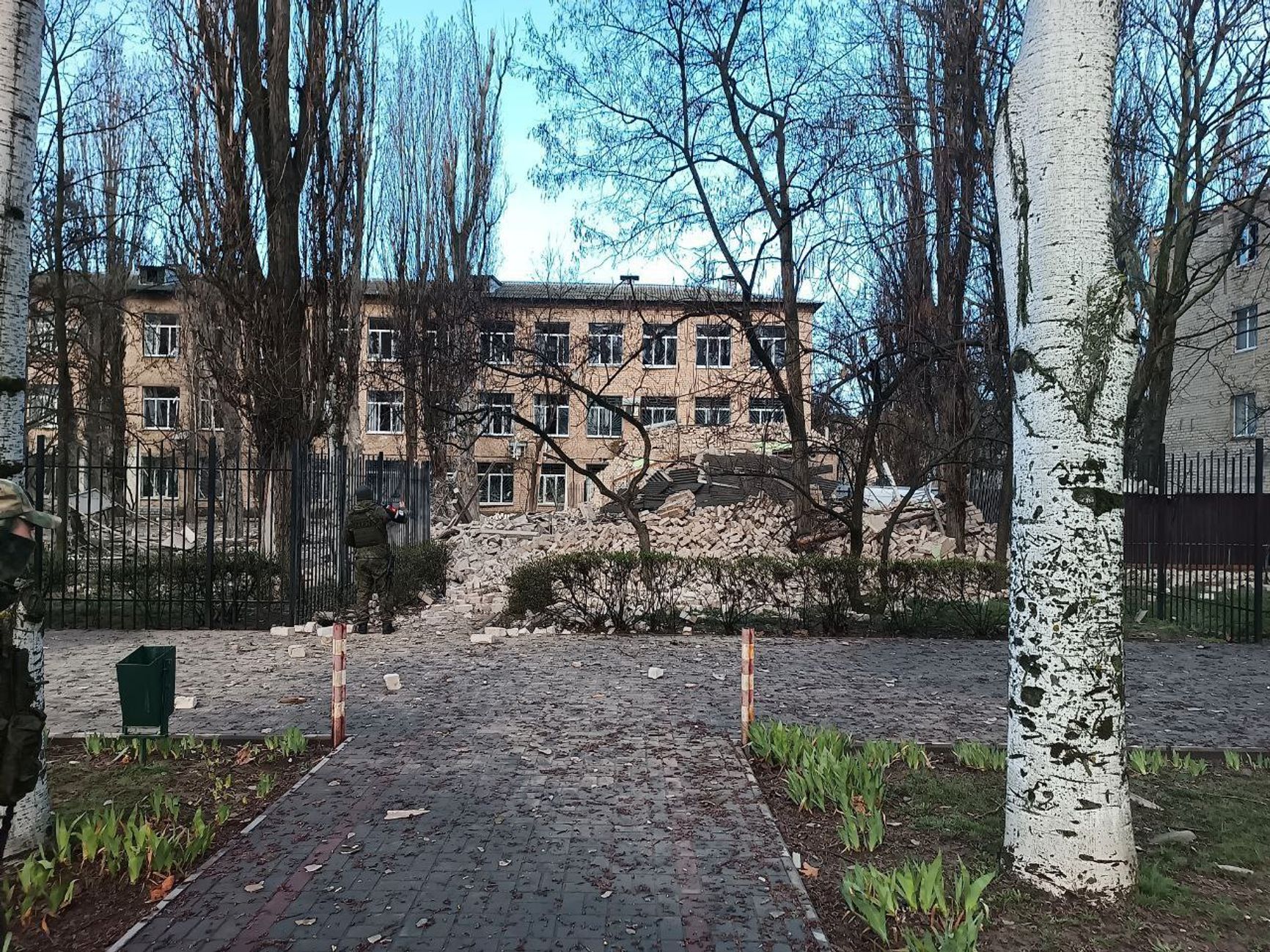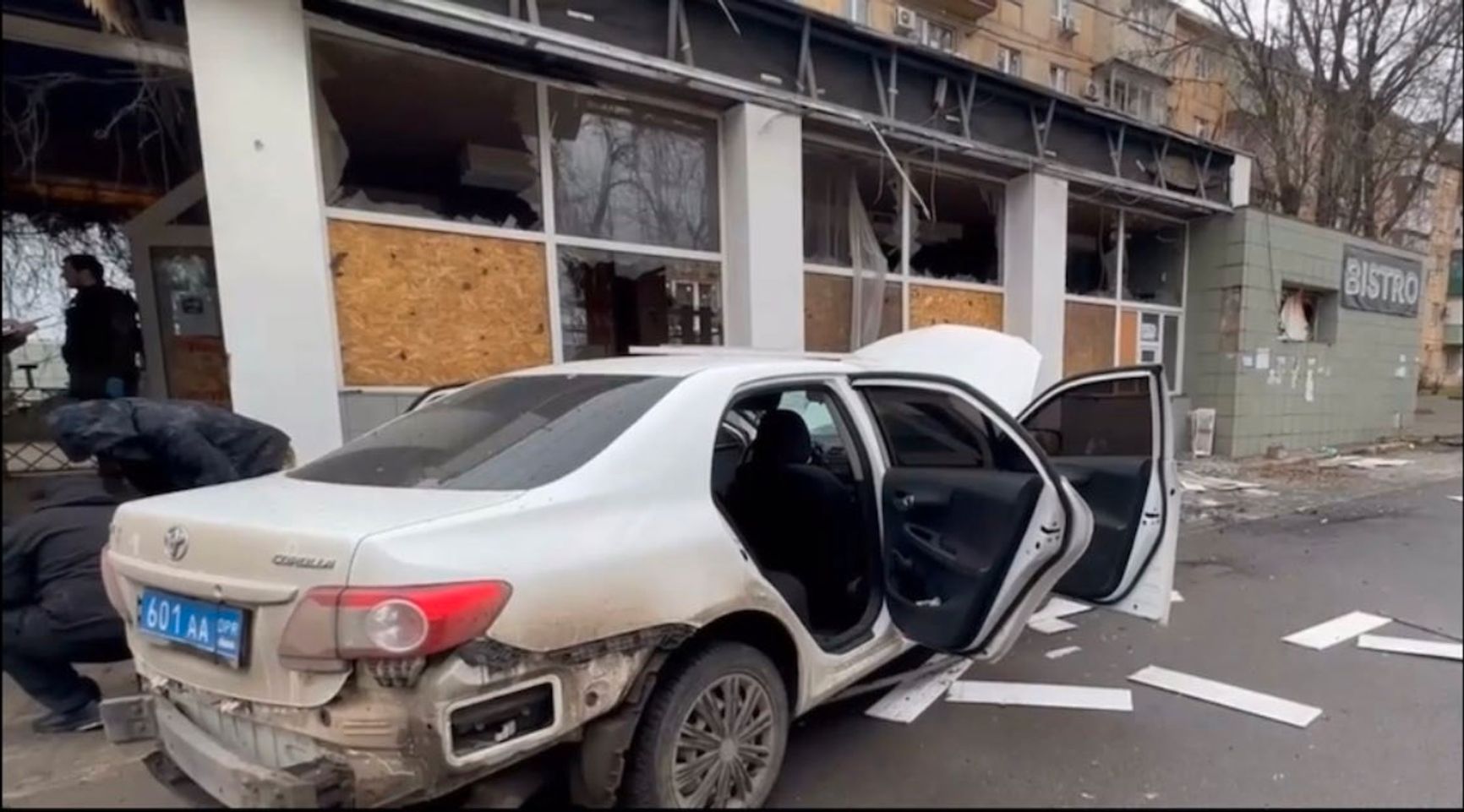
The front line
Russian forces are advancing in the Kupiansk, Lyman, Bakhmut, Avdiivka and Marinka directions, according to a report by the Armed Forces of Ukraine (AFU) General Staff dated March 27. The Ukrainian army repelled more than 60 attacks in the past 24 hours. The Russians continue to storm Bakhmut, as well as the villages of Bohdanivka and Ivanivske in the Donetsk region.
Bakhmut
Konstantin and Vlada Liberov
Bakhmut
Konstantin and Vlada Liberov
Bakhmut
Konstantin and Vlada Liberov
Oleksandr Syrskyi, Commander of the AFU’s Ground Forces, visited the front line on the Bakhmut axis. “The most intense phase of fighting for Bakhmut continues. The situation is steadily difficult. The enemy suffers significant losses in manpower, weapons and military equipment, but continues the assault,” Syrskyi reported.
Yevgeny Prigozhin, the founder of the Wagner PMC, said that “the [Russian] Ministry of Defense has taken over the security on the flanks” of the group besieging Bakhmut. The positions around the town are currently manned mostly by mercenaries from the PMC.
Shelling
Russian forces shelled Sloviansk with S-300 missiles. According to a statement from the Donetsk Regional Military Administration, two people were killed and 32 wounded, including a child. Five multi-story buildings and seven private homes, as well as administrative and office buildings, were destroyed.
Sloviansk
According to the AFU, over the past 24 hours, Russia shelled populated areas in the Sumy, Kharkiv, Zaporizhzhia, Kherson and Donetsk regions.
There were explosions in occupied Melitopol on the morning of March 27. Vladimir Rogov, a member of the council of the Russian-appointed “administration” of the Zaporizhzhia region, reported that a college building was partially destroyed and four people were injured as a result of an AFU artillery strike.

Russian military Telegram channels reported that Ukrainian artillery shelled the Russian-occupied Lysychansk in the Luhansk region. A hospital, two residential buildings and a gas pipeline were damage . There were also reports of strikes on the Kalinin district of Donetsk, which resulted in several apartment buildings catching fire. Casualties among the local population have also been reported.
On March 26, a drone exploded in Kireevsk in Russia’s Tula region, damaging 12 homes within a radius of 200 meters. The Russian Defense Ministry claimed that the region was attacked by a Tu-141 Strizh strike drone, which did not reach its target as it was downed after being affected by the Russian Pole-21 electronic countermeasures system.
Losses
The AFU General Staff claims that 610 Russian servicemen were killed in the past 24 hours. About 100 bodies of Russian servicemen were reportedly taken to the morgue in the village of Troitske in the Luhansk region. A local hospital admitted 140 seriously wounded soldiers for treatment.
The Russian army is said to have lost six armored fighting vehicles, seven artillery systems, and one multiple rocket launcher system (MLRS) during the day.
Arms deliveries
Eighteen Leopard 2 tanks and 40 Marder combat vehicles have arrived in Ukraine from Germany, according to a report from Der Spiegel. Ukrainian Defence Minister Oleksiy Reznikov later announced that he had taken part in tests of the new equipment received by AFU: Challenger tanks, as well as Stryker, Cougar and Marder fighting vehicles.
In turn, the UK Defense Ministry reported that Ukrainian tank crews had completed training courses to operate the British Challenger 2 tanks and returned to Ukraine to continue fighting. The training began in January, shortly after the UK authorities announced that they would transfer 14 Challenger 2 tanks and shells to Kyiv.
Israeli military expert David Gendelman told The Insider that the new tanks would be most useful during a large-scale counterattack:
“The incoming tanks should go to staff the new brigades and reserve corps that are being created. Using them in isolation is ineffective, the main benefit from [the] tanks should be during a counterattack, where they should be used as part of battalion or brigade tactical groups in close cooperation with infantry, artillery, engineers, reconnaissance, and so on. The start date of the offensive primarily depends on the accumulation of the weapons and military equipment required by the plan and secondarily on weather conditions. When both conditions are met, then we’ll see the offensive and the role of tanks in it.”
Russia has added Su-35 fighter jets to the air units involved in the war with Ukraine, which could give it air superiority, a high-ranking Ukrainian official told ABC News. According to him, the Su-35s are equipped with «with very effective radar and long-distance rockets,» and Russia is using these aircraft to attack Ukrainian jets in the air as well as for ground support operations. The official stressed that Ukraine «does not have capabilities» to counter this threat.
The Wall Street Journal reported, citing sources familiar with the matter, that Russia had transferred capabilities in the field of electronic intelligence and surveillance to Iran in exchange for supplies of kamikaze drones.
Assassination attempt on Russian police chief in Mariupol
A car belonging to the Russian-appointed head of the city's police department, Mikhail Moskvin, was blown up in occupied Mariupol. According to Russian state-owned news agency TASS, Moskvin was a few meters away from the car at the time of the explosion, and suffered a concussion, but survived.

IAEA Director visits Dnipro Dam
IAEA Director General Rafael Grossi met with Ukrainian President Volodymyr Zelenskiy as part of a joint visit to the Dnipro Hydroelectricpower Plant to inspect the damage to the dam. Grossi stressed that the facility is “an integral part of the system that ensures the nuclear safety of the Zaporizhzhia NPP [Nuclear power plant]”.

British intelligence: threat of drone attack constrains operations of Russian Black Sea Fleet
A British defense intelligence summary published on March 27 stated that the Russian fleet in the Black Sea has been attacked by air and surface drones at least twice in the past six months. Specifically, on March 22, three unmanned boats and a drone attempted to strike the Sevastopol naval base, but the attack was repelled and no Russian vessels were damaged. During the previous attack on October 29, 2022, surface drones damaged the minesweeper Ivan Golubets and the frigate Admiral Makarov. “The uncrewed surface vessel (USV) threat likely continues to constrain operations of Russia’s Black Sea Fleet,” the update said.
Russian nuclear weapons in Belarus
On March 25, Vladimir Putin announced the construction of a storage facility for tactical nuclear weapons in Belarus, causing Kyiv to demand an urgent meeting of the UN Security Council. Josep Borrel, the EU’s chief diplomat, responded by saying the EU would impose new sanctions if nuclear weapons were deployed in Belarus.
Orlando Bloom visits Ukraine
British actor and UNICEF Goodwill Ambassador Orlando Bloom visited Kyiv, Irpin and the village of Demidiv. In Kyiv, Bloom met with Volodymyr Zelensky, and said he would support humanitarian aid and infrastructure rehabilitation projects for Ukrainian children.

Russian prosecutor's office sends inspectors to “DPR” following complaint from Kaliningrad military
Officers from Moscow have arrived in the Donetsk region with an unannounced inspection at the request of Russia's military prosecutor's office following the publication of an appeal recorded by mobilized soldiers from Kaliningrad, reported independent outlet 7x7. The publication cited a friend of one of the authors of the appeal, Nikolai Rakov, as confirming the inspection. The appeal was recorded by servicemen from the “Shtorm” squadron, who spoke of the assault of Vodyane, during which their commanders drove the soldiers forward “towards machine guns, mortars, and tanks,” forbid them to retreat and threatened “to destroy them.”
Russian paratroop commander Dmitry Lisitsky reported dead
Ukrainian media and military bloggers reported the death of Dmitry Lisitsky, a battalion commander in Russia’s 247th Air Assault Regiment. According to Ukrainian sources, the battalion under his command shot up a column of AFU troops during their exit from the “Ilovaisk cauldron” in 2014, during events that have come to be known as the “Ilovaisk tragedy.” Russian media personality Ksenia Sobchak's Telegram channel claimed that Lieutenant Colonel Lisitsky committed suicide.